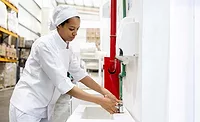Taking a Byte Out of Sanitation Data Handling in the Food Plant
For Northeast Foods, Inc., producing the highest quality buns and English muffins to meet the demand of its many fast food industry clients nationwide, including McDonald's Corp., not only means following quality standards to the letter, but making a total commitment to food safety.
"In my short time with Northeast Foods, I have found that the company has a total commitment to food safety in all of its facilities," says Steve Vogel, sanitation manager of the Baltimore, MD-based company, which is part of the H&S Bakery Co. family of bakeries. "Plant management stresses and strives for total food safety and quality for all of our customers. This is supported through continuous training for employees, as well as self-inspections of our plants and equipment to ensure that we have total food safety."
Keeping up-to-date on food safety, Hazard Analysis and Critical Control Point (HACCP), Good Manufacturing Practices (GMP) and internal sanitation procedures, tracking and analyzing collected data, and having those records available for auditors can be a daunting task for sanitarians. "Sanitation used to just clean. Now it is cleaning and maintaining the supporting documentation for the cleaning procedures," notes Vogel.
In order to more effectively manage today's pressing documentation requirements, Northeast Foods is using a specialized food sanitation management software program that is "very detailed and requires a lot of thought in setting up," he adds. "But once it is set up, the program tracks all of your sanitation requirements and provides the documentation that is very much in demand in this day and age."
The KLEANZ Sanitation Management software, developed by Nexcor Technologies in conjunction with the American Institute of Baking (AIB) Food Safety Education Department, is designed to address the administrative redundancies of running a modern sanitation department so that sanitation managers like Vogel can focus on their primary task, according to Robert Burgh, Nexcor's founder. The Atlanta, GA-based company develops software for all areas of the modern bakery and food processing plant, including maintenance and sanitation management, sales tracking and logistics.
"The responsibilities of the food plant sanitation department have changed significantly during the past 15 to 20 years," says Burgh. "In the past, sanitation simply meant that employees were responsible to get the plant clean without getting in the way of production and without being disruptive. Today, in addition to cleaning the plant, sanitation departments must understand microbiology, food safety methods and how to provide documentation for legal, regulatory and internal compliance purposes.
"As a result, the increasing paperwork requirements are becoming overwhelming to many sanitation departments, and often, department management is spending less time supervising and more time with paperwork. This pulls the sanitation management staff away from focusing on the job at hand in the plant--cleaning and sanitizing."
Building the Sanitation Data Matrix
In developing the KLEANZ Sanitation Management software, Burgh visited many food plants to determine the needs of the sanitation department with regard to record keeping and data management. Of the challenges food sanitation staff reported, says Burgh, most could be effectively addressed and resolved simply by computerizing the data.
"For example, in many of the plants, we found an amazing amount of overlapping audit, regulatory and internal information in three-ring binder notebook after three-ring binder notebook. It became clear that one misfiling of a page in a notebook could easily hurt the plant in a given inspection score," he says. "Similarly, there is a real need to be able to show the auditor or regulatory inspector adequate documentation that is easily retrievable. When the inspector shows up at the plant six months after identifying problems for which corrective actions must be taken, the sanitation manager must be able to show what the company has done about it, when it was done--and be able to find that data without having to go through page after page in several notebooks."
The ability to track employee training is another important area identified by food plant sanitation managers as a critical aspect to consider in data automation. Nexcor found that the ability to show what kind of training each employee has received, what tests they've taken, what certifications they've achieved and when certifications expire has become a requirement for the sanitation department. "Sanitation departments today find that better tracking of employee knowledge helps in ensuring that tasks are properly implemented."
Ultimately, it is the responsibility of the plant sanitation team to identify what work is to be done, how it is to be done and when it is to be done, along with identifying the safety measures that need to be taken to limit exposure to hazardous materials and situations and/or to correct them. At the same time, management must ensure that staff is adequately trained, as well as be able to document compliance with internal and external food safety audit programs and to effectively report sanitation data to a number of different regulatory agencies.
"If the management is spending time doing paperwork as opposed to supervising and improving sanitation efforts in the plant or training their people," he concludes, "it is probably a good idea to consider automating the record keeping and documentation efforts."
nexcor.com
Looking for quick answers on food safety topics?
Try Ask FSM, our new smart AI search tool.
Ask FSM →






